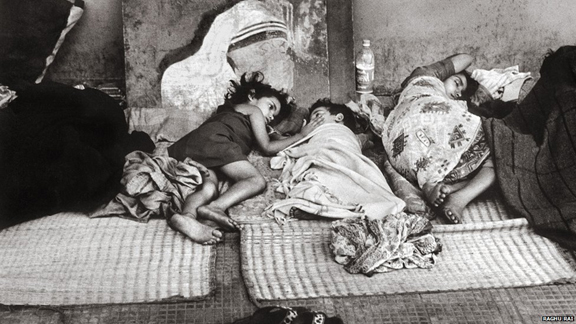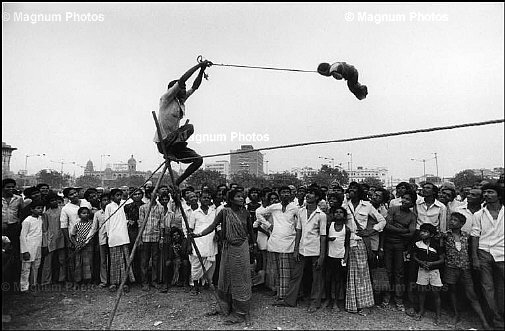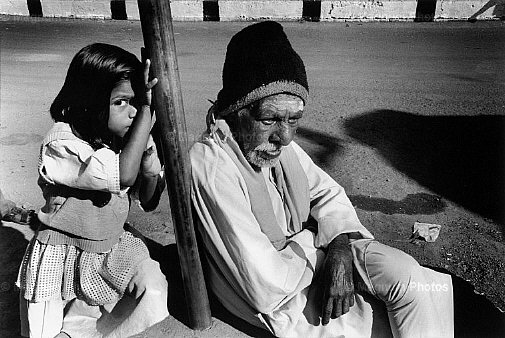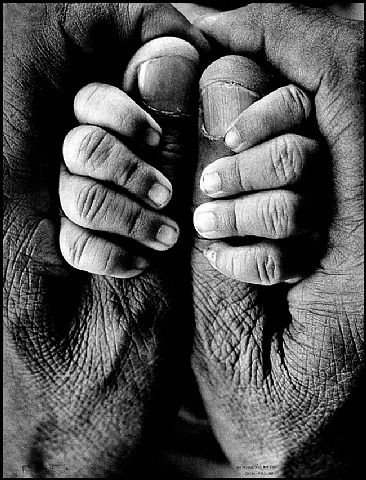DNA Testing can protect children used for begging. But certainly not in the way that the Maharashtra government proposes. Dr. Pravin Patkar responds to the recurring issue of policy proposed by the Govt of Maharashtra. (http://www.dnaindia.com/mumbai/report-maharashtra-government-planning-to-test-dna-of-beggar-children-2058534)
The DNA Proposal

The Government of Maharashtra proposes to carry out DNA tests on the children used for begging and on persons in whose custody these children are found. It claims that the procedure would conclusively reveal if the latter are the biological parents of the child or not. If they are found to be unrelated, the government proposes to trace the parents through an online DNA database and thus, reunite the children with their families. This is not for the first time the govt has announced its intention to bring about such a policy. The proposed policy option needs to be properly understood as it is being announced repeatedly and may be taken up for formal approval.
Barring a few people who have raised their eyebrows over the idea that someone’s DNA report will be collected and stored by the government in its data bank apparently there is not much objection to the idea of DNA testing per se. Considering the seriousness and rising number of the cases of ‘missing and found but untraced’ children mostly belonging to certain weaker and vulnerable sections of the society as well as the technological superiority and indispensability of DNA matching the vague objection to creating a DNA data bank might not get much attention. Nonetheless it may be stressed at the outset that DNA data being sensitive must be handled carefully and responsibly.
At face value the idea looks noble and appealing. On closer inspection it will be clear that it is vague and full of defects and gaps. What must be appreciated is the announcement of the State’s desire to do something about the issue of children used for begging. Although in its current form, it is naïve, poorly conceptualized, and based on incorrect presumptions.
The Presumptions in the State’s Design:
The policy option is based on many presumptions such as;
i. Most children used at the signal posts for begging are trafficked.
ii. The person (often a young woman) taking the child around for begging is a trafficker/ kidnapper.
iii. If she is a mother then she is not a trafficker.
iv. Most of them are Indian children and adults.
v. There is a complaint somewhere in the country about the child going missing.
vi. The real parents must have approached the local police station to file a complaint.
vii. The local police station must have filed an FIR as per the Orders of the Supreme Court.
viii. The local police station would have carried out the DNA test of the complainant parents and uploaded the report on the website.
ix. The website has the technical capability to undertake data matching in all the states of India and South Asia.
x. The complainant parents are eager to get the child back.
xi. It is alright to hand over the child back to the parents from whose custody the child might have already been trafficked in the past.
xii. The parents have not knowingly sold the child.
xiii. On receiving the child back the parents will not sell the child again (and again and again).
xiv. The child (especially a little grown up) is keen to go back to and stay with its parents and in the first place has not run away from the parents not being able to tolerate starvation, deprivation and physical violence.
Any social worker experienced in the issues of anti human trafficking, child protection, violence against children, and missing children in South Asia will vouch that all of these presumptions are grossly wrong and baseless. The otherwise is more likely to be true.
The Questions That are Unanswered By The Proposal:
The proposal raises some unanswered questions such as;
i) What if the DNA of the child and its custodian match? Will the state stop at that presuming that biological parents have a right to use their children for begging and the State is not mandated to protect those children from their own parents?
ii) Is it required to first prove that the child does not belong to the person who is the custodian of the child in order to protect that child from being used in begging?
iii) What if the woman displaying and exposing the child at the signal posts is herself a victim of human trafficking and is operating under criminal force?
iv) Do all (or most) States in India and South Asia have a system of keeping biometric and DNA reports of the complainants?
v) If they do is there a system of data sharing among the Indian states and the South Asian countries,
vi) Are the States in India and South Asia eager to get their children back to their states?
One again, any social worker experienced in the fields of anti human trafficking, child protection, violence against children, and missing children in India will answer these questions in the negative.
The Information Gaps

The proposal also points at an information gap at the Government of Maharashtra level. As a research consultant to Plan International on this issue and as a part of the regional exercise where State, Civil Society Organizations, International Organizations and SAARC are working together to connect the data systems of Nepal (Childline), Bangladesh (DNet) and India (TrackChild) to address the regional issue of missing children, I strongly feel that the above proposal implies that the government is not aware of what is being promoted at the South Asian regional level by the governments and SAARC.
If these children are abandoned children, which is a fact in a high number of cases then there is no way the parents would approach a police station to file a missing complaint. If the family does not complain, there is no alternative way to identify a missing child.
The gap between missing children and filing of complaints is phenomenal. After the two 17th January 2013 and 10th May 2013 (Writ Petition (Civil) No. 75 of 2012 BBA Vs Union of India & Ors) Orders of Supreme Court on missing children, police stations are under pressure to register an FIR in every case of a missing complaint and start the investigation presuming a trafficking or kidnapping angle.
As is, the police stations in South Asia are notorious for refusing to register an FIR in most crimes. There is little hope to believe that it will be registered in the case of missing person complaints.
Reunion: Not Always the Answer

Although the UN Convention on the Rights of a Child 1989 and the Juvenile Justice Act of India give prime importance to the restoration of a child in his/her family as a matter of right it is a lofty ultimate goal. It is also based upon an axiom that a family is a heaven for its members. A family is not a static phenomenon. It is undergoing constant transformation.
The families from where these children go ‘missing’ and join the rank of ‘Found but Untraced” children living in the metropolises without any responsible adult protection and supervision are themselves the victims of displacement, uprootment, impoverishment, collective violence, economic depression, and such other ever increasing factors. Many of these families are not in a position to provide for the basic survival of the child. In some cases they look the other way when the child is being trafficked. At times they sell their own children.
Therefore restoring a child to the family is not often a wise decision. The state and civil societies should be guided by the principle of the best interest of the child. Fortunately both, the UNCRC as well as the JJ Act, acknowledge and recommend that.
Many children get physically separated from their families as a result of an accumulated unfavourable situation primarily resulting from maltreatment, deprivation, forced migration, and consequent disintegration of the family. Such situations also fuel domestic violence against children and an episode of gross verbal or physical violence precipitates their running away from their families to unknown destinations. There is little desire in these children to go back. The families, often, are not in a position to provide for their basic necessities let alone for their developmental needs. In majority of the cases, reunion with the family is not the solution to the problem.
Even in cases where the children are actively trafficked it is seen that the family is incapable of providing minimum protection and support to the child thereby rendering the child vulnerable to getting trafficked. If the family continues to be ill-equipped to provide the required protection the chances of the reunited child getting re-trafficked are almost 100%.
The Loophole

The proposal conveys that if the DNA reports do not match then the government will take over the custody of the child from that person and try to locate the child’s real parents/ guardians for reunion or keep the child in shelter facilities in the state custody for long term care and protection. The intention looks good although the path suggested is unnecessary.
As per the established practice in India where the natural parents/legal guardians of a child are found incapable of carrying out their parental responsibilities, the state takes over the parent-ship of the child unto itself with the force of law (the doctrine of parens patriae).
It is not at all necessary to prove (whether by DNA testing or otherwise) that the adult in whose custody the child is found is not the child’s natural parent/legal guardian. Day in and day out, the states of India (Maharashtra State included) through legally constituted bodies like the Child Welfare Committee or Juvenile Justice Board under the Juvenile Justice Act have been doing that as a matter of routine. In short, when as an established practice, a child can be and is taken away from its lawful natural biological parents under the force of law where is the need to conduct the DNA test and prove that the custodian is not the parent?
What if the DNA test shows that the woman who is using the child at the signal posts for begging purposes is the biological mother of the child? Does that mean the state shall allow her to continue using the child for begging?
Of course not! As under the UN Convention 1989 as well as under the JJ Act the state is expected to act in the best interest of the child which may also mean taking over the custody of the child and placing the child with a fit person (preferably in a foster scheme) or fit institution (institutionalization). Even in such a scenario, DNA testing becomes unnecessary.
A Necessary Database

This author has in the past recommended and demanded ‘careful and responsible’ use of biometric data as well as DNA test reports to address the issue of ‘missing’ and ‘found but untraced’ children at the South Asian regional level. At a Global CSR Conclave of NASSCOM in the year 2010 where I was invited to speak on the issue of ‘Missing children and the role of software industry’ I made a submission for this.
My submissions were based on the following points;
i) In a situation where conventional parameters of identity like name, surname, height, weight, clothes, address as told by the complainants are unreliable and where the conventional physical identities like facial photograph are ever changing especially in the case of children, the use of other biometric readings and DNA report becomes indispensable.
ii) The amount of data that need to be fed and matched being huge, use of computerised internet based data matching systems is indispensable.
iii) As the nature of the data is sensitive and as the non state actors do not have the locus standi to gather or disseminate it, the State must be the prime mover of the solution.
iv) As the issue is cross border in nature the solution involves extra territorial authority to ensure sustained coordination between India and the other two neighboring countries namely Nepal and Bangladesh where the States must own the solution and be its prime movers.
The head of UID/Aadhar card scheme Mr. Nandan Nilekani was also a speaker at the event. In a plenary I had expressed my suggestion to have the DNA of the children recorded and integrated in the UID data bank.
My suggestion was to start collecting the DNA reports of the children and their families initially belonging to the areas from where there are large scale complaints of missing children as well as to collect the same for the thousands of Found but Untraced” children where are living without parents, guardians, or any responsible adult protection in the most popular destination areas (metropolises like Mumbai). Although Mr Nilekani instantly discarded my demand as very expensive, I was not convinced of that reasoning.
Found But Untraced Children

Having worked on the issue of human trafficking with a focus on South Asia for the last few decades, I have networked extensively with the anti human trafficking actors at various levels in some of these countries. The truth that we have observed is quite bitter. In many cases the parents facilitate the trafficking of their children. There could be various explanations for this act of the parents. Many communities are actively involved in facilitating the illegal migration, smuggling, and trafficking of their own young ones. In such cases the proposal of family reunion not only becomes irrelevant and impractical but also dangerous for the children.
Not only the children used for begging at the signal posts but several other children are actually living without any responsible adult care, protection and supervision. They can be easily found in our cities and towns in garages, workshops, shops, eateries, informal factories, sweatshops, tourism places, and in such other hazardous workplaces. They are addressed by various terms like street children, child labour, missing children, abandoned children, trafficked children etc. It is highly unlikely that there would be a missing complaint registered in any police station about them.
I insist on using the term ‘Found but Untraced’ children for them instead of labelling them ‘missing’. Social intervention in the issue of missing children cannot start with missing children as it is not a positive category but a mere ‘complaint’. However ‘Found but Untraced’ children is a reality that we come across every day.
By setting up data banks that maintain comprehensive biometric data and software that enables massive data matching it will be easy to find the biological parents and legal guardians of the ‘Found but Untraced’ children. I am not suggesting reunion as the only logical next stop. The best interest of the child may not lie in the child going back to the family.
‘Found but Untraced’ children are today living all over this country without any political identity, citizenship, passport, ration card. They have no document to prove who they are and that they exist. The issue is most ill attended today but has horrible implications.
A large responsibility of looking after them is currently carried out by the civil society organizations. For every such child the civil society organization has to seek charitable support. Most of these children are living life on their own. Even if some of them are brought under the residential care of a CSO the financial burden falls on the CSO and consequently the child gets nothing as a matter of right. Even when they are given vocational training, without any identity document to prove who they are, they can hardly move upwards in the job market and adult life. There is a high probability that most of these children actually belong to social categories like SC/ST/OBC/DNT/Nomadic tribes etc and hence are entitled to various services and schemes of the State under its positive discrimination policies. In absence of any proof of their identity, they are unable to avail of these reservations and programmes.
Once their identity is established these children will be able to claim whatever little asset base they would have otherwise inherited. If they get what is rightfully theirs then the children will rely less on charity and more on the State’s funds.
These children have a right to family name and political identity. Reunion or no reunion, with DNA based data matching it will be possible to restore their identity to them. They should not be deprived of their social political identity merely because they belonged to a weak or incapable or irresponsible family.
It has been my studied observation that in many cases of intra-country as well as cross-border trafficking the families and the communities act hand in gloves to deny any identification of the child thereby foiling the efforts of the governments and CSOs of the destination States. In such cases with the help of DNA reports the identity of the child can still be established regardless of the inclination of the family, community and their own state.
While suggesting the use of DNA test I have unfailingly qualified it by the terms ‘careful and responsible’ to qualify the use of DNA based data as I am aware that such highly sensitive data falling in the wrong hands can cause severe misuse. At the same time the importance, indispensability and increasing need for DNA reports cannot be denied. Crime has become extremely technically complex and dangerous and the protective measures to be taken against them in order to protect the citizens cannot be taken with the consent of individual members. A victim of crime caught up in a dangerous situation is to be rescued and protected forthwith by the state and the civil society. Any delay in doing so could result in irreversible damage.
Strengthening The Existing Protection Mechanisms

Coming back to the proposal of the WCD Ministry of Maharashtra, DNA testing is not required to prove that the child used in begging does not belong to the custodian and thus to justify rescuing the child, even from its biological parents. The existing laws allow the state to do that without the DNA test report. The existing machineries like the CWC are aware and experienced enough to handle such situations. The government should not be very optimistic about the possibility and propriety of family reunion. Often even well-meaning families fail to protect their children. Strengthening family based, community based, school based protection mechanisms is the appropriate recommendation.
An Issue of Child’s Consent

There are no two opinions that the children who are used for begging purposes are children in need of care and protection. It is the responsibility of the state and the civil society to act fast and yet sensitively in their best interest. A careful and responsible use of DNA reports will immensely boost the positive intervention.
There is a misplaced suggestion that the consent of the victim child should be secured before taking the DNA test. Clearly the principle of consent is not understood properly. A victim of a complex crime like human trafficking, it has often been observed, is not free and competent to understand her situation or to express one’s consent correctly. The repercussions of many crimes termed as crimes against individuals are not necessarily confined to the individual.
They have repercussions to the society as well. Hence the measures to be taken to protect the individuals cannot be conditional to the consent of the individual.
When the victim is a child the issue of its consent becomes all the more irrelevant. The permission of their biological parents or legal guardians is also not necessary and should not be allowed to come in the way of removing the children from dangerous circumstances. Many children trafficked for the organized crime of begging are infants- the new borns stolen straight from the maternity homes.
Are we going to wait for their consent?
- Dr. Pravin Patkar
(all photos by raghu rai)

No comments:
Post a Comment